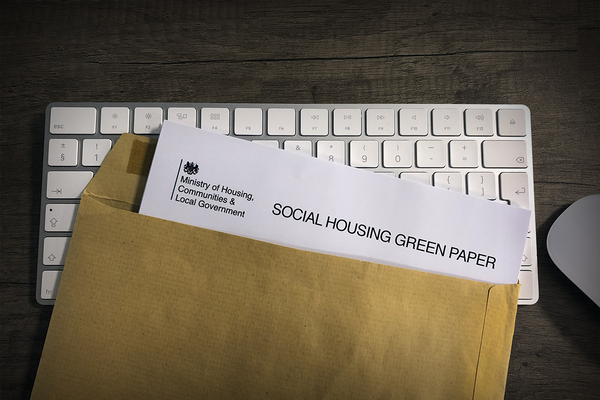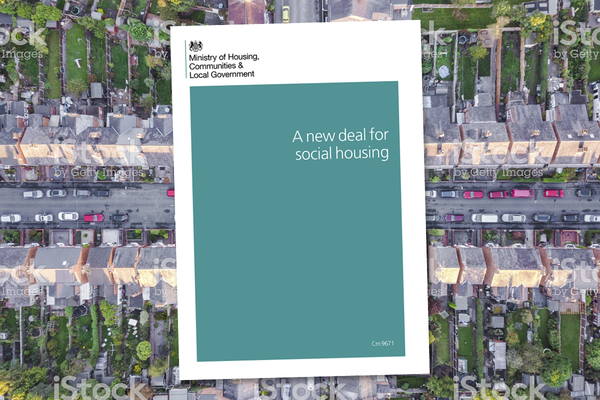You are viewing 1 of your 1 free articles
The green paper is remarkable progress but it is still not enough
The green paper suggests the government appears to be re-writing much of its policy since 2010, but more needs to be done, writes Jules Birch
For all its faults (and there are many), the Social Housing Green Paper is still a remarkable document.
What I think it is the first-ever housing green paper from a Conservative government represents progress in itself – rather than taking half-baked ideas from right-wing thinktanks and putting them straight into legislation, the government is actually consulting us on its policies.
But that is just for starters: the green paper runs up the white flag on two of the barmiest and controversial elements of the Housing and Planning Act 2016, and goes on to propose what amounts to a rewrite of much more of what the government has done since 2010.
The two explicit U-turns mean that local authorities will no longer be required to pay a levy on higher-value council homes as they fall vacant and fixed-term tenancies will no longer be mandatory for new council tenants.
“The green paper goes on to propose what amounts to a rewrite of much of what the government has done since 2010.”
This is not a complete surprise – neither policy had yet been implemented – but it is an indication of just how much the Grenfell Tower fire has changed the politics of social housing.
And the non-implementation (or even repeal) of the forced sales levy means that there is no source of funding for a third policy that was a flagship Conservative manifesto pledge in 2015 – the extension of the Right to Buy to housing association tenants.
While the green paper has some token references to the pilot programme and the possibility of portable discounts, this undermines the whole basis of the deal that most housing associations enthusiastically signed up to when they thought somebody else would be paying the deal.
The smell of burnt rubber does not stop there. Among the many proposals to give tenants more say and rights of redress is the first consultation on the regulation of social housing since 2010.
Resident dissatisfaction with their landlords, says the green paper, “could stem from the adequacy of the current consumer standards, the way in which they are enforced or both”.
In particular, it highlights the limits on the regulator’s ability to enforce consumer standards imposed by the ‘serious detriment’ test and the need for a better service for residents.
This entire system was of course the product of the 2010 review and the determination of former housing minister Grant Shapps to make the Tenant Services Authority ‘toast’ and scrap all that nonsense about empowering residents.
The parallels do not stop there: the green paper also asks whether there is “a need for a stronger representation for residents at a national level”.
Might one option be to restore the National Tenant Voice that the government unceremoniously scrapped in 2010?
Other elements of the green paper also have a retro feel.
The title – A new deal for social housing – harks straight back to the slogans of 1997 and it proposes an update of perhaps the most successful New Labour housing policy, the Decent Homes Standard.
So far, so good. All of these changes represent a recognition that the post-2010 Conservative view of social housing as a subsidy-hogging, poverty-generating tenure is no longer tenable.
Instead there is a direct reference back to the era when the Tories vied with Labour to promise more council houses as the green paper revives the slogan from the 1951 Conservative manifesto about housing being “the first social service”.
“All of these changes represent a recognition that the post-2010 Conservative view of social housing as a subsidy-hogging, poverty-generating tenure is no longer tenable.”
But the proposals only go so far. Ministers heard loud and clear from tenants that one of their biggest concerns is tackling stigma and the green paper has lots of warm words.
However, it will take more than a street party or a best neighbourhood competition to reverse what is the legacy of years of government policy, and ministers cannot in one breath say they value social housing and in the next argue that it should be “a springboard to homeownership”.
While expanding supply is seen as one of the five key themes, there is no new money, not even in additional borrowing capacity for local authorities and it was no surprise to hear housing minister Kit Malthouse flounder on the Today programme this morning.
The green paper puts its faith in league tables or (worse) an NHS-style ‘friends and family test’ as ways of holding landlords to account for their performance, and even hints at linking grant to league position, but it is far from clear how any of this will work.
“There is no new money, not even in additional borrowing capacity for local authorities and it was no surprise to hear housing minister Kit Malthouse flounder on the Today programme this morning.”
And then there’s another legacy of Mr Shapps’ era: the promise to replace additional homes sold under increased Right to Buy discounts with new homes on a one-for-one basis.
Another separate consultation admits what was clear from the start – that the promise cannot be kept – but it proposes not so much a U-turn as a moving of the goalposts.
Local authorities are offered flexibilities, including longer time to use the receipts and a potential increase in how much of a home they can pay for in some areas but could also be allowed to replace sold-off social rent homes with shared ownership.
And in case that does not work, the government is also keen to change the terms of the promise itself by counting all sales and all new affordable homes.
This is a green paper that would have been unimaginable even two years ago and which proposes some positive changes to some very negative policies introduced since 2010.
That is progress in itself but, as with Monday’s rough sleeping strategy, it does not go far enough. We are still waiting for what Sajid Javid, former housing secretary, promised would be “the most substantial report of its kind for a generation”.
Jules Birch, award-winning blogger
Social Housing Green Paper: full coverage
All our Social Housing Green Paper coverage in one place:
Green paper measures are not enough to create May’s ‘new generation’ of council homes Green paper proposals are welcome but much more is needed to support councils to build, writes John Bibby
Green paper shows ministers now see associations as trusted partners Focusing on the failure of the green paper to address supply misses the point, writes Boris Worrall
Government should focus on building on what is already strong Philippa Jones considers the Social Housing Green Paper through a slightly different lens
We need more than a week of delayed announcements bundled together Jules Birch reflects on the government’s ‘Housing Week’ announcements
The regulator should monitor how associations assist homeless people Government announcements this week are positive, but any enhanced role for the English regulator should include looking at homelessness prevention work, argues David Bogle
The regulator’s role should be limited to dealing with systemic failures Julian Ashby suggests the Housing Ombudsman Service should deal with all complaints
The green paper shows ministers are in listening mode Despite some glaring omissions, the government appears to be in listening mode and it is important the sector takes advantage, argues Emma Maier
A short history of social housing league tables Attempts to create league tables for housing associations are nothing new. Mervyn Jones looks at how they have worked in the past
League tables could prove blunt and counter-productive, sector warns Housing figures criticise government proposals to measure social landlords against performance indicators
Government ‘must decide how proactive regulator should be’ on consumer standards Ministers now face a dilemma over the regulator’s focus, sector figures say
The Green Paper: a golden opportunity missed? Melanie Rees assesses the Social Housing Green Paper against recommendations drawn up by the Chartered Institute of Housing and finds the government comes up short
Longer strategic partnerships and guranteed debt to boost social housebuilding The Social Housing Green Paper outlines key ways of boosting supply
The green paper is remarkable progress but it is still not enough The green paper suggests the government appears to be re-writing much of its policy since 2010, but more needs to be done, writes Jules Birch
Green paper marks a ‘milestone’ on resident involvement The government’s recognition residents need clear information is to be welcomed, now it up to the sector to embrace tenant involvement, writes Paul Hackett
Ministers consider stock transfer programme to community-led associations The stock transfer programme could be revived under proposals in the housing green paper
Access to housing grant could be tied to new league tables Grant could be awarded according to how well landlords meet performance indicators, the paper suggests
Ofsted-style regulation of tenant services proposed The government is considering expanding the Regulator for Social Housing’s remit to intervene over tenant services and give it a more “proactive approach to enforcement”
Government proposes dropping one-for-one Right to Buy replacement commitment A consultation paper published alongside the green paper proposes a broader measurement to replace the one-for-one pledge
A list of recent housing policy U-turns The green paper confirms yet more housing policy U-turns from the government, which has spent the past two years dropping policy ideas developed under the David Cameron government. Here is a rundown of the major changes in policy direction
Sector welcomes green paper but calls for more ‘ambitious investment’ Reaction to the proposals, from the National Housing Federation, Chartered Institute of Housing and more
Morning Briefing: reaction to green paper announcements how the media reported the proposals trailed by the government overnight
Government drops plans to force councils to sell higher-value stock The government drops plans to force councils to sell higher value homes
League tables and ‘sharper teeth’ for regulator in social housing green paper Ministers reveal some of the things in the paper ahead of its publication
Grenfell survivors: green paper does not go far enough survivors of the Grenfell Tower fire have said the measures published in the Social Housing Green Paper do not do enough to rectify issues in the social housing sector












